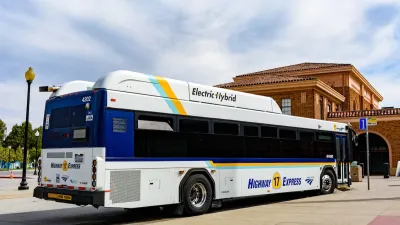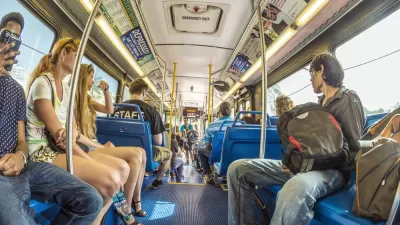The conventional wisdom among Americans who spend lots of time thinking about public transit is that four more years of Obama will be good news, and the election of the Romney-Ryan ticket would be bad. I have to admit that this belief is by no means completely irrational: after all, President Romney will be much less likely than President Obama to veto a transportation bill passed by a Republican Congress, and might propose a mere austere budget than President Obama. Nevertheless, I think there are good reasons to believe otherwise.
The conventional wisdom among Americans who spend
lots of time thinking about public transit is that four more years of Obama
will be good news, and the election of the Romney-Ryan ticket would be
bad. I have to admit that this belief is
by no means completely irrational: after all, President Romney will be much
less likely than President Obama to veto a transportation bill passed by a
Republican Congress, and might propose a mere austere budget than President Obama. Nevertheless, I
think there are good reasons to believe otherwise.
First of all, a Republican Congress of 2014 might differ
somewhat from a Republican Congress of 2012.
Under President Obama, a rational Republican Congressperson is likely to
try to distinguish himself/herself from the President in order to avoid a
right-wing primary challenge; as a result, President Obama's support for public
transit and high-speed rail has probably reduced GOP support for these policies.
But the history of the 2000s suggests that a Republican
Congress working with a Republican President may have different
incentives. After George W. Bush became
President, the Republican Congressional majority was willing to accommodate constituents'
support of Amtrak and public transit.
Between FY 2001 and FY 2007 (when the Democrats took over Congress) federal
aid to public transit increased from $6.9 billion to $8.9 billion, a 29 percent
increase (By contrast, the consumer price index increased by only 19 percent
during that period). Transit ridership
also increased during this period, from 9.6 billion to 10.2 billion.
Furthermore, a Republican Congress may unintentionally support local government revenues, and thus local public transit authorities, by supporting expansionary fiscal
and monetary policies (as opposed to austerity policies that might reduce economic
growth and thus cut into local revenues).*
Under President Romney Republicans will need immediate economic growth
in order to be reelected, since a stagnant economy would make President Romney
unpopular, thus dragging down Congressional Republicans. (By contrast, under President Obama
Republicans had little incentive to support short-term growth, since growth
would benefit President Obama). Assuming
for the sake of argument that Republicans were in fact successful in promoting nationwide economic growth, local tax revenues would recover, thus increasing support for public transit
and other local government programs.
Even if Congressional Republicans do not move to the center,
a Republican Congress might not last for four years under President Romney. When Clinton
was reelected in 1996, the Republicans held Congress, and continued to do so
until well into the Bush Administration. Similarly, when President Reagan was reelected in 1984, and Vice-President Bush succeeded him in 1988, the Democrats held the U.S. House. In other words, when incumbent Presidents are reelected they do not have long coattails.
This pattern suggests that as long as Obama is President, Congressional
Republicans are in a no-lose situation: if people are satisfied, they vote for
the incumbents of both parties (so Republicans hold the House), while if they
are dissatisfied, they punish the President's party (which means that if Obama
is unpopular, the 2014 elections will yield a bigger and perhaps more
radicalized House Republican caucus). Thus, the Republicans will not suffer significant Congressional losses until the first midterm election after a Republican President is elected (that is, until 2018 at the earliest).
On the other hand, if Romney is elected and the economy does
not grow in 2014, the Democrats will take over Congress. Assuming that Congressional Democrats are
more pro-transit than Congressional Republicans, this reason alone may make
Romney the better choice for transit advocates. (Of course, President Romney could decide to propose austere budgets- but if Democrats control Congress, his proposals would receive exactly as much deference as President Obama's budget proposals, which is to say none whatsoever).
Of course, all of this is just speculation, and I cannot say
for sure that a Romney Presidency would be better for transit advocates than
four more years of President Obama and a Tea Party Congress. I do think, however, that this is a
reasonable possibility.
*I am assuming that austerity policies do in fact reduce
economic growth, and that expansionary policies support growth; I note,
however, that many economists of the "Austrian school" reject this view.

Americans May Be Stuck — But Why?
Americans are moving a lot less than they once did, and that is a problem. While Yoni Applebaum, in his highly-publicized article Stuck, gets the reasons badly wrong, it's still important to ask: why are we moving so much less than before?

Using Old Oil and Gas Wells for Green Energy Storage
Penn State researchers have found that repurposing abandoned oil and gas wells for geothermal-assisted compressed-air energy storage can boost efficiency, reduce environmental risks, and support clean energy and job transitions.

Placekeeping: Setting a New Precedent for City Planners
How a preservation-based approach to redevelopment and urban design can prevent displacement and honor legacy communities.

San Francisco’s Muni Ridership Grew in 2024
The system saw its highest ridership since before the Covid-19 pandemic, but faces a severe budget shortage in the coming year.

Colorado Lawmakers Move to Protect BRT Funding
In the face of potential federal funding cuts, CDOT leaders reasserted their commitment to planned bus rapid transit projects.

Safe Streets Funding in Jeopardy
The Trump administration is specifically targeting bike infrastructure and other road safety projects in its funding cuts.
Urban Design for Planners 1: Software Tools
This six-course series explores essential urban design concepts using open source software and equips planners with the tools they need to participate fully in the urban design process.
Planning for Universal Design
Learn the tools for implementing Universal Design in planning regulations.
Heyer Gruel & Associates PA
City of Moreno Valley
Institute for Housing and Urban Development Studies (IHS)
City of Grandview
Harvard GSD Executive Education
Salt Lake City
NYU Wagner Graduate School of Public Service
City of Cambridge, Maryland






























